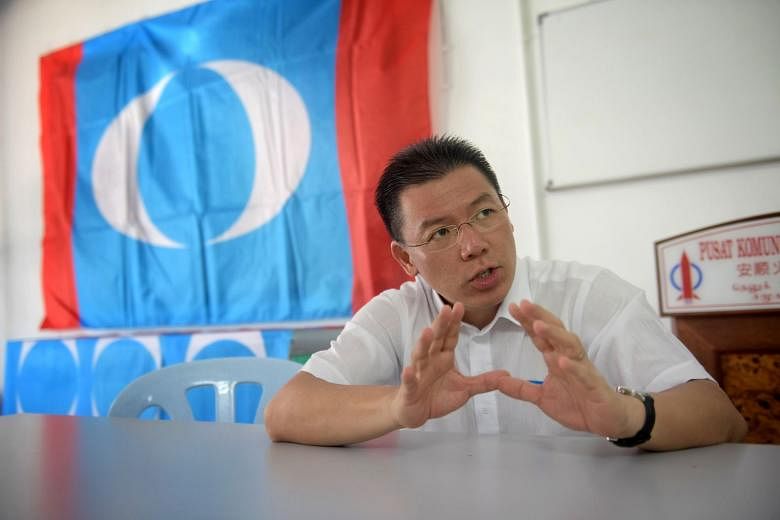KUALA LUMPUR - A leader of Malaysia's Democratic Action Party (DAP) said the party is ready to quit the country's ruling coalition, which has been in power for 20 months, for its failure to recognise the Unified Examination Certificate (UEC) for Chinese schools.
The threat comes at a bad time for the four-party Pakatan Harapan (PH) government which is already weakened by infighting, plunging voter support and renewed optimism in the opposition camp led by Umno and Parti Islam SeMalaysia (PAS) after winning five by-elections.
The Chinese-based DAP has 42 MPs, or 30 per cent of PH's 139 lawmakers in the Malaysian Parliament. Only Datuk Seri Anwar Ibrahim's Parti Keadilan Rakyat (PKR) has more MPs, 50, in the Lower House.
DAP deputy secretary-general Nga Kor Ming told Chinese paper Oriental Daily: "We reached a consensus that DAP will withdraw from the government if UEC is not recognised.
"It doesn't matter if we are no longer part of the ruling government. This is the principle we will uphold."
Part of the interview with Mr Nga was uploaded on the paper's website on Wednesday (Jan 29).
Nr Nga later told Free Malaysian Today (FMT) online news that his remarks were taken out of context in an hour-long interview with the Chinese-language newspaper about parliamentary reforms. He also tweeted his response to the news site.
"Obviously it has been taken out of context and the heading is inaccurate," he told FMT, when asked to comment on a report about his remarks in Malaysiakini news site. He was referring to Malaysiakini's headline 'Nga: DAP will not hesitate to leave gov't if UEC not recognised'
The UEC is equivalent to an A-level certificate for Malaysia's 300-plus independent Chinese secondary schools. Its official recognition would allow certificate holders to apply for entry into all local colleges and use it when applying for local jobs.
Recognising the UEC is one of the election promises made by PH.
Malaysia's Education Ministry set up a task force to look into the issue of recognising the UEC in October 2018, five months after winning the general election.
But the Mahathir Mohamad administration, just like the previous Umno-led Barisan Nasional (BN) government which ruled the country for 61 years, is believed to be dragging its feet because most Malay voters are dead set against the UEC's recognition. Malays would like to see all post-secondary students taking up the national A-level equivalent exams, STPM.
A report in The Star newspaper in July last year said the UEC exams were into its 45th year then after being introduced in 1975, with nearly 646,000 certificate holders in total.
The report said the UEC is recognised by higher learning institutions in places such as Singapore, Britain, the United States, Australia, China, Taiwan and Japan. Many UEC holders must now study abroad to get degrees, a big financial burden for poor Chinese families.
Recognition of the certificate by the government was central to the DAP's campaign platform to claim Malaysian Chinese are marginalised when it was in the opposition. The party often railed against the Malaysian Chinese Association, a component party of the then ruling BN, for failing to get the government to recognise the certificate.
Today, the DAP is facing the same pressure from the Chinese community, which comprises 21 per cent of Malaysia's 32 million population.
Mr Nga in the interview acknowledged that his party has been criticised for not being vocal in raising issues, as it was an opposition party.
His response: "DAP is not silent after becoming part of the government. We are braver to speak out, now that we have the government channel and this can be seen in the Cabinet meetings."
Raising the UEC issue with a threat to quit the PH government won't win Mr Nga or the DAP any brownie points within the coalition.
PH is today wrestling with several major issues.
There is a push by Mr Anwar's PKR faction to force Prime Minister Mahathir to retire by May this year, the two-year anniversary when PH came to power.
PKR itself is bitterly split between a faction led by its president Anwar and deputy president Azmin Ali, with the Azmin group keen to see Tun Dr Mahathir continuing until the next election which is due in 2023.
Voter support for PH has plunged, as it has failed to ameliorate the cost of living, while the main opposition parties Umno and PAS have forged unity that saw them winning five of the last six by-elections.


